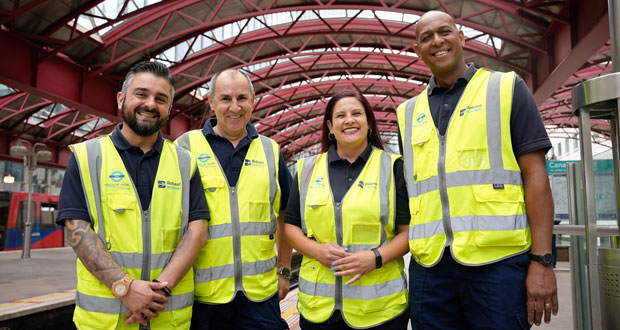Bidvest Noonan has joined forces with KeolisAmey Docklands, operator of the Docklands Light Railway (DLR), to launch a sustainable cleaning initiative, which aims to substantially increase the sustainability of cleaning operations by eliminating single-use plastics, reducing packaging by 95 per cent, and cutting product transport-related carbon emissions also by 95 per cent across the DLR network.
To achieve these ambitious goals, Bidvest Noonan and KeolisAmey Docklands are introducing a range of innovative cleaning solutions. These include pre-dosed formulations supplied in water-soluble sachets. This approach ensures precise usage, reduces waste, and eliminates the risk of chemical overdosing, which can negatively impact the environment.
The partnership has also transitioned to recyclable packaging with certified compostable pouches, underscoring a commitment to environmentally friendly practices.
Adam Prust, Key Account Director at Bidvest Noonan, said: “This initiative is a major step forward in our commitment to sustainability. We are protecting the environment and setting a new standard in our commitment for the reduction of single use of plastics across the DLR contract.”
Keith Middleton, Managing Director at Bidvest Noonan commented: “We are thrilled to partner with KeolisAmey Docklands on this initiative. This collaboration reflects our shared vision of creating a cleaner, safer, and more sustainable environment for commuters and staff alike. The new solutions make it easier and safer for our teams to perform their duties efficiently.”
The DLR is the busiest light railway in the UK, serving 100 million passenger journeys per year across its 40 km-long network.
Frontline workers form the backbone of facilities management services, serving as the face of the brand and interacting directly with customers. Yet research by both L&G and the Living Wage Foundation reveals the majority feel overlooked and expendable.
Accelerating the problem is a growing technology gap. Despite having 2.7 billion deskless workers worldwide, representing 80 per cent of the global workforce, only one per cent of software and technology investments has been allocated to this segment. This means there is a huge disconnect between frontline workers and their headquarters, leading to lack of sufficient training, communication challenges and low employee retention.
For this webinar, FMJ has teamed up with frontline training platform Lingio to bring together a panel of experts, to discuss how easy-to-use and efficient AI tools can help create engaging and gamified learning experiences that fit the needs of underserved deskless workers. The result? Better software and learning experiences lead to improved staff engagement and reduced staff turnover by up to 95 per cent, according to McKinsey.
To register for the webinar taking place on 11 September at 11:00 am click here.





